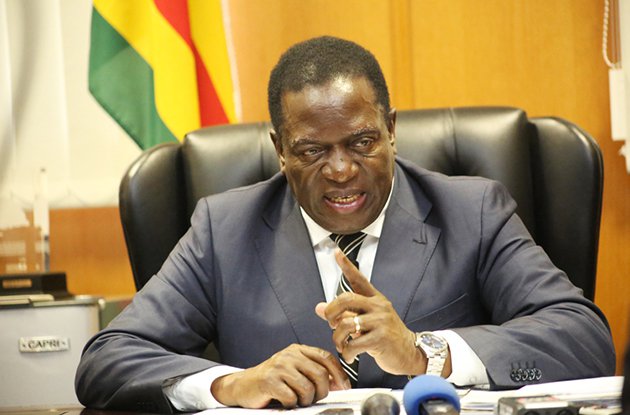News / National
Mnangagwa signs 'Gukurahundi' Bill into law
08 Jan 2018 at 06:13hrs |
7341 Views

President Emmerson Mnangagwa on Friday signed the National Peace and Reconciliation Commission Bill (NPRC) into law, making operational a Commission that was appointed in 2016.
The announcement was made by Chief Secretary to the President and Cabinet Dr Misheck Sibanda under General Notice 2 of 2018 in Friday's Government Gazette.
"The following law, which has been assented to by His Excellency the President, is published in terms of Section 131 (6) of the Constitution of Zimbabwe – National Peace and Reconciliation Commission Act (Chapter 10:32 (No.11 of 2017)," Dr Sibanda said.
The Act provides for the functions, powers, operations and removal from office of the members of the Commission, manner of conducting investigations and staffing of the Commission, among others.
It also provides for the independence of the Commission and empowers individuals that may have been affected by any dispute or conflict out of any act of omission or commission on the part of an authority or person to make oral or written submissions to the Commission in any one of the official languages.
In the new Constitution Zimbabwe has 16 official languages.
If the complainant has died, his or her legal practitioner or representative can make the complaint on their behalf.
The Act also directs the Commission to establish a gender unit that will provide guidelines on gender mainstreaming in its work.
The secretariat of the Commission will be headed by an executive secretary and will be responsible for the day-to-day running of the agency.
Annual reports on accounts and investigations expected to be generated by the Commission will be submitted to Parliament.
In addition, the Act compels the Minister responsible for national healing to respond within six months of a report being presented to the august House, outlining recommendations to be implemented and those that will not be implemented, including the reasons for not implementing them.
The NPRC is established under Sections 251 to 253 of the Constitution to ensure post-conflict justice, healing and reconciliation, to develop programmes to promote national healing, unity and peaceful conflict resolution and will run for the next 10 years.
The eight-member National Peace and Reconciliation Commission was appointed in 2016 and was chaired by the late former Speaker of Parliament Mr Cyril Ndebele.
A new chairperson is yet to be appointed.
The other commissioners are Lilian Chigwedere, Patience Chiradza, Choice Ndoro, Charles Masunungure, Geoffrey Chada, Leslie Ncube and Godfrey Chekenyere.
The announcement was made by Chief Secretary to the President and Cabinet Dr Misheck Sibanda under General Notice 2 of 2018 in Friday's Government Gazette.
"The following law, which has been assented to by His Excellency the President, is published in terms of Section 131 (6) of the Constitution of Zimbabwe – National Peace and Reconciliation Commission Act (Chapter 10:32 (No.11 of 2017)," Dr Sibanda said.
The Act provides for the functions, powers, operations and removal from office of the members of the Commission, manner of conducting investigations and staffing of the Commission, among others.
It also provides for the independence of the Commission and empowers individuals that may have been affected by any dispute or conflict out of any act of omission or commission on the part of an authority or person to make oral or written submissions to the Commission in any one of the official languages.
In the new Constitution Zimbabwe has 16 official languages.
If the complainant has died, his or her legal practitioner or representative can make the complaint on their behalf.
The secretariat of the Commission will be headed by an executive secretary and will be responsible for the day-to-day running of the agency.
Annual reports on accounts and investigations expected to be generated by the Commission will be submitted to Parliament.
In addition, the Act compels the Minister responsible for national healing to respond within six months of a report being presented to the august House, outlining recommendations to be implemented and those that will not be implemented, including the reasons for not implementing them.
The NPRC is established under Sections 251 to 253 of the Constitution to ensure post-conflict justice, healing and reconciliation, to develop programmes to promote national healing, unity and peaceful conflict resolution and will run for the next 10 years.
The eight-member National Peace and Reconciliation Commission was appointed in 2016 and was chaired by the late former Speaker of Parliament Mr Cyril Ndebele.
A new chairperson is yet to be appointed.
The other commissioners are Lilian Chigwedere, Patience Chiradza, Choice Ndoro, Charles Masunungure, Geoffrey Chada, Leslie Ncube and Godfrey Chekenyere.
Source - chronicle
Join the discussion
Loading comments…







































